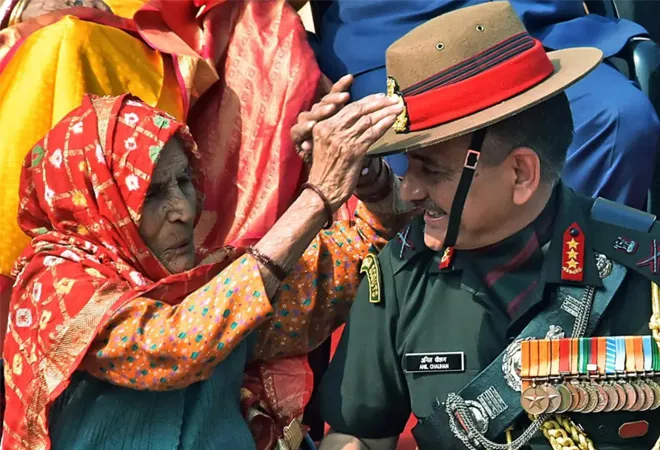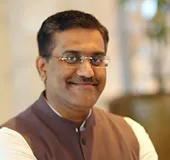After an extended wait of more than nine months, India got a new Chief of Defence Staff (CDS), with the
appointment of General Anil Chauhan on September 30, 2022. This post had fallen vacant after the tragic death of General Bipin Rawat in December 2021 in an air crash. Before he was appointed CDS, General Chauhan served as the Military Advisor in the National Security Council Secretariat, which enabled him to work closely with the National Security Advisor, Ajit Doval and cultivate an inter-agency perspective at the apex decision-making of the national security establishment.
General Chauhan has served many commands and staff postings in the North and Northeast. As Major General, he commanded the Baramulla-based 19
th Infantry Division in the Northern Command and therefore has invaluable experience in countering cross-border terrorism emanating from Pakistan. His biggest strength, however, is his stint in the China-facing Eastern Command, from where he retired as the Commander in May 2021. Earlier, he had commanded the Dimapur-based III Corps. General Chauhan also served as the Director General of Military Operations between 2018-19, when the military carried out the Balakot airstrike in February 2019, in response to the Pulwama terror attack in Kashmir.
As Major General, he commanded the Baramulla-based 19th Infantry Division in the Northern Command and therefore has invaluable experience in countering cross-border terrorism emanating from Pakistan.
Apart from managing the rapidly evolving China front and crafting a response to the emerging two-front theatre problem, the most challenging tasks confronting the new CDS will be shaping a joint combat posture for the Indian military and pursuing the goal of defence self-reliance to reduce India’s costly dependence on imported equipment.
The CDS’ central
mandate is the theaterisation of the commands, seeking to integrate the capabilities of the three services. As the first CDS, General Rawat had
proposed establishing five theatre commands to replace the current 17 service-specific commands and consequently create a joint combat capability. He had doggedly chased this plan, overcoming the severe opposition from the Navy and particularly the Air Force, whose senior leadership has remained
vocal in publicly expressing
scepticism over theaterisation.
This opposition notwithstanding, India has initiated steps to institute joint capabilities. Significant among these is the
creation of three new tri-service commands in 2018-2019, including Defence Space Agency, Defence Cyber Agency, and Armed Forces Special Operations Division, which synergise the three services’ critical capabilities for future battlefields. Reportedly, the government is also considering the
formation of a joint missile command to integrate missile and rocket regiments. Besides these, the military
operationalised Joint Logistics Nodes in April 2021 in Mumbai, Guwahati, and Port Blair, providing integrated logistics services to the military.
General Chauhan will follow through with this necessary reform. In doing so, he will have to specifically allay the concerns of the Navy and Air Force that their capabilities won’t be subsumed under the joint command mechanism. But, more importantly, he will have to implore the three services to shed their silo-based approach and evolve an integrated view of the future battlefield ning sea, air, land, cyber and space domains. He will also have to tackle the thorny issue of the Navy’s steadfast demand for a third aircraft carrier to elevate India’s naval profile in the Indo-Pacific theatre, a demand on which General Chauhan’s predecessor had
expressed doubts.
As the first CDS, General Rawat had proposed establishing five theatre commands to replace the current 17 service-specific commands and consequently create a joint combat capability.
A related challenge for General Chauhan will be overseeing the most significant manpower reform in India’s military history, the Agnipath recruitment scheme. While the government and the military have already operationalised it, he will have to manage any initial teething problems the scheme may encounter in implementation. In addition, the CDS has to ensure that the new recruitment scheme does not come at the cost of diluting the military’s combat preparedness.
Defence indigenisation or self-reliance is another of the key tasks for the CDS. General Rawat had been instrumental in bringing out the
indigenisation list, which mandated only domestic procurement of listed major equipment/platforms for the military. General Chauhan will undoubtedly push for further progress on this objective. The potential disruption of India’s defence supply chains due to the Ukraine conflict and subsequent Western sanctions on the Russian defence and aerospace sectors will give him the crucial imperative to pursue this goal.
However, in doing so, he has to tackle two issues. One is to encourage the three services to go in for jointly acquiring equipment and therefore develop interoperability. But an even more significant responsibility for the CDS will be exploring means to work around the protracted defence acquisition process. This has often delayed the purchase of critical equipment and affected India’s combat preparedness. It has also impeded greater participation of domestic private companies in the defence sector. It is one of the reasons why the Indian military has had to resort to the emergency route in acquiring hardware to meet immediate operational requirements.
The potential disruption of India’s defence supply chains due to the Ukraine conflict and subsequent Western sanctions on the Russian defence and aerospace sectors will give him the crucial imperative to pursue this goal.
The CDS is an inherently political appointment, combining seniority, experience, and trust of political leadership. Bringing multiple stakeholders together to achieve common national objectives requires a political acumen that is rare. As he gets down to fulfilling his mandated tasks, General Chauhan will have to demonstrate sufficient flexibility and relevant administrative skills to prepare the Indian military to effectively fight future wars as well as advise civilian leadership on how best to manage national security challenges.
This commentary originally appeared in The Economic Times.
The views expressed above belong to the author(s). ORF research and analyses now available on Telegram! Click here to access our curated content — blogs, longforms and interviews.




 PREV
PREV



